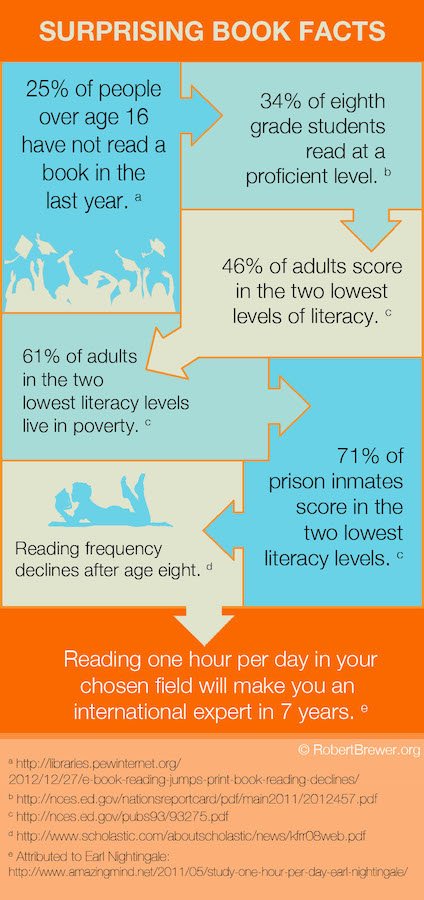To Read or Not to Read? Who is and Isn't?
In 1990, National Governors' Association members produced a set of national education goals that would guide this country into the twenty-first century. One of the six goals states: By the year 2000, every adult American will be literate and possess the knowledge and skills necessary to compete in a global economy and exercise the rights and responsibilities of citizenship.
OK, this was a predictably unreachable goal partly because people have chosen not to read very much.
I'm going to start with a graphic from Robert Brewer.
By 2011, 21 to 23 percent — or some 40 to 44 million of the 191 million adults in this country — demonstrated skills in the lowest level of prose, document, and quantitative proficiencies (Level 1). Though all adults at this level displayed limited skills, their characteristics are diverse. Many adults at this level performed simple, routine tasks involving brief and uncomplicated texts and documents. For example, they were able to total an entry on a deposit slip, locate the time or place of a meeting on a form, and identify a piece of specific information in a brief news article. Others could not perform these types of tasks, and some had such limited skills that they could not respond too much of the survey.
Only 18 to 21 percent of the respondents, or 34 to 40 million adults, performed in the two highest levels of prose, document, and quantitative literacy (Levels 4 and 5). These adults demonstrated proficiencies associated with the most challenging tasks in this assessment, many of which involved long and complex documents and text passages.
Who doesn't read books in America?
Roughly a quarter of American adults (23%) say they haven't read a book in whole or in part in the past year, whether in print, electronic or audio form, according to a Pew Research Center survey of U.S. adults conducted Jan. 25-Feb. 8, 2021. Who are these non-book readers?
According to the survey, several demographic traits are linked with not reading books. For instance, adults with a high school diploma or less are far more likely than those with a bachelor's or advanced degree to report not reading books in any format in the past year (39% vs. 11%). Adults with lower levels of educational attainment are also among the least likely to own smartphones, an increasingly common way for adults to read e-books.
The same demographic traits that characterize non-book readers also often apply to those who have never been to a library. In a 2016 survey, the Pew Research Center found that Hispanic adults, older adults, and those living in households earning less than $30,000 were among the most likely to report in that survey they had never been to a public library. And those who have a high school diploma or did not graduate from high school were among the most likely to report in that survey they had never been to a public library.
Why
How to teach reading skills and existing reading curricula often do not align with the current science of how students learn. Studies suggest that incorporating the science of reading practices studied by psychologists, linguists, and neurobiologists into the classroom will dramatically reduce the number of children on track to become functionally illiterate adults.
Millions of great books are sold yearly, but sadly, statistics show that half the books bought in this country are never read!
Student Profile: Adriana
As many of you are aware from reading the Literacyworks Newsletters, our students are a group of remarkable individuals. They are low-income and are entering school reading and writing below college level.
They face significant challenges, but their will to succeed and reach their goals is remarkable. Adriana is one such student. She moved from Mexico many years ago to pursue an education. Adriana discovered that she had a progressive illness that caused her to go blind. The challenges for a non-sighted person are considerable, especially in a new culture and when English is not her first language. Adriana had to learn how to access college. She had to figure out transportation and living arrangements. Santa Rosa JC was very supportive in providing access to technology that allows Adriana to read and use a computer and a phone. She started the Literacyworks Center program over two years ago. In addition to providing financial support, the Center staff connected Adriana with several agencies in the county that provide additional help for the non-sighted.
The Center organized volunteers to meet her at the bus and help her find her way to the classroom.
Adriana is now fluent in English and will receive a Certificate in Early Childhood Education at the end of this semester. She will continue to take classes to meet her General Education requirements. Her long-term goal is to become a translator working with new immigrants as they negotiate the challenges of a new culture. We will be watching as she creates a new future for herself.
~ Chris
ASK
As we near the end of each year, we traditionally share with you the accomplishments of the Literacyworks Center and our students and ask for your continued financial support.
As part of our current Literacyworks Center population, we have seen an ever-growing need for working with two groups of students aged 18-24: Latino ESL learners and foster youth. Our program assists them in staying in college. They are primarily first-generation college students. Also, because of the hardships caused by the Pandemic, we are increasing our outreach to our students to help them find housing, food, and mental health resources.
We are asking you to support a student or more. It takes $3,000 a year to enable Center students to reach their goals and stay in school for a full academic year. We do whatever it takes to help our adults succeed in college, but we can't do it without you. Your gift of any amount creates meaningful change for our students, families, and communities. All of our adults are low-income, low-literacy members of our community and are the first in their families to go to college. Many are parents. Their perseverance in reaching their educational goals encourages their children to excel in school and follow their example to attend college.






